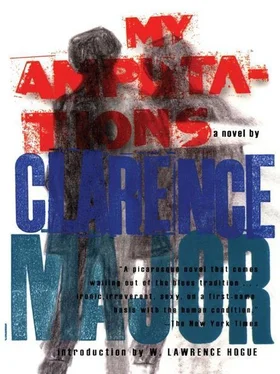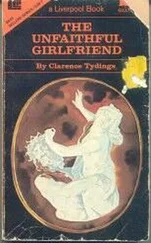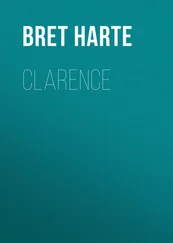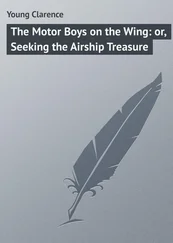Clarence Major - My Amputations
Здесь есть возможность читать онлайн «Clarence Major - My Amputations» весь текст электронной книги совершенно бесплатно (целиком полную версию без сокращений). В некоторых случаях можно слушать аудио, скачать через торрент в формате fb2 и присутствует краткое содержание. Год выпуска: 2008, Издательство: Fiction Collective 2, Жанр: Современная проза, на английском языке. Описание произведения, (предисловие) а так же отзывы посетителей доступны на портале библиотеки ЛибКат.
- Название:My Amputations
- Автор:
- Издательство:Fiction Collective 2
- Жанр:
- Год:2008
- ISBN:нет данных
- Рейтинг книги:5 / 5. Голосов: 1
-
Избранное:Добавить в избранное
- Отзывы:
-
Ваша оценка:
- 100
- 1
- 2
- 3
- 4
- 5
My Amputations: краткое содержание, описание и аннотация
Предлагаем к чтению аннотацию, описание, краткое содержание или предисловие (зависит от того, что написал сам автор книги «My Amputations»). Если вы не нашли необходимую информацию о книге — напишите в комментариях, мы постараемся отыскать её.
My Amputations — читать онлайн бесплатно полную книгу (весь текст) целиком
Ниже представлен текст книги, разбитый по страницам. Система сохранения места последней прочитанной страницы, позволяет с удобством читать онлайн бесплатно книгу «My Amputations», без необходимости каждый раз заново искать на чём Вы остановились. Поставьте закладку, и сможете в любой момент перейти на страницу, на которой закончили чтение.
Интервал:
Закладка:
It might be safe over here to quietly assume his “rightful” identity again. Do a few readings for the bread, which he needed already. Signard, head of the International Humanities Institute for Cultural Exchange's Speakers' Bureau had already expressed interest in response to his, Mason's letter from Nice. Hence this trip… Not likely to bump into hellcat Brad? or agents from MRF?… But surely that woman was Edith!
Paris, Paris! IHICE kept a low-profile: entrance in a court-way (not visible from street) of an old apartment building across the street from the famed cemetery called Père Lachaise. After Signard, a quirky little man, gave Mason an advanced check and his itinerary (he'd read at the University of Paris to a class of grad students studying contemporary American fiction) the booking agent walked out onto Avenue Gambetta with Mason and expressed his delight in the beautiful weather. He also told Mason that the university people would wine and dine him either before or after the event. Mason watched him talk. Signard twitched as he reached for Mason's hand. At that moment another man approached. Signard showed signs of recognition, if not delight. The guy looked familiar to Mason. Very! The fact got his fear churning again. Signard made a nervous leap, yanking the two — Mason and the new-arriver — together; meanwhile, forcing their hands together and introducing them at the same time. Mister Familiar's name was Alm Harr Fawond. Arab? But… the American accent? Anyway, the moment lasted less than the time it takes a fly to tune his legs. Then Mason was on his way, with not a second thought.
In search of Richard Wright's ashes, he entered the cemetery's profusion of gravestone and leaf and although he didn't find Wright hidden at the foot of a stairway to vaults, he found the lonely graves of Stein and Modigliani and, yes, Balzac and Roussel and one big, blunt tomb marked simply, “Family Radiguet.” Bewildered, he came out at a brisk pace… But Mason wasn't ready for Paris. One bookstore on the Left bank was full of giddy young Americans. Plus he couldn't find his own name (the one, I mean, that he insisted was his) on any spine on the shelves. Pigalle was a flesh hustle that bored him. The lines were too long at the museums. Night life was more expensive than it was worth. He thought of going out to Auvers-sur-Oise to lie down on the bed-springs in the tiny room where Van Gogh died, just to feel, or try to feel, the weight of his own body in that moment. No, there was no good reason to spend a lot of time in Paris. He'd give the reading, go to dinner with his hosts, then split for Nice.
Back in Nice he moved into the whitewashed apartment. Sold the Trojan Horse — his Simca. Got a Fiat. Felt better. Changed from BNP to Credit Lyonnais. The labyrinthian estate was owned by an Italian family, the Rosatis. The villa itself was a credible altar to the sun overlooking the sea. The owner's villa was up at the northern end of the estate. Downstairs beneath Mason's tiny place lived the Barilis. Madame and Monsieur Barili worked for the Rosatis. Mainly they cared for and puzzled over the sturdy carnations. They also exorcised and harvested the pears, grapes, cherries, plums, olives, in season. Rosati — a frail, tiny old man, his wife, daughter, son-in-law and three grandchildren — also worked the land. Being here for Mason was like being in parentheses. Yet — something in Barili's eye. A charm? the look of a spell weaver? Mason felt the eye of a fiend upon him when he passed the fat dark Italian. Surely he was not some diabolical version of The Impostor? That elusive renegade couldn't possibly be here! Here was no place for a prince of rogues: Pegasus somehow had connected the earth and heaven. Every day Mason saw sea horses down there flying up out of blue… Yet he couldn't get over the feeling of being a lame duck. Next door? In the big apartment lived five women and two men. Mason saw them going and coming. Their motorbikes parked out in the drive. While taking his garbage down to the roadside one morning he met one of the young women — Monique. Since he'd left coffee brewing on the stove, he invited her up for a cup. Skullduggery? She had dark hair and a shy face. While they drank the bitter brew at his kitchen table they heard the Barilis out in the yard. Some wild smell was in the air. Mason went to the window. Behind him Monique said, “These blood I cannot watch.” Mason saw Madame Barili carrying two rabbits by their hind legs. Her husband waited for her by the clothesline where four other — skinned and pink — rabbits were hung by their legs. Monsieur Barili took one of the two rabbits from his wife. Holding it by its hind legs, he quickly, expertly, drove the tip of the blade into the animal's neck — just behind its jaw. Then he stood holding it like that till most of the blood had poured out onto the ground. The other long-eared creatures squirmed and squeaked. Madame Barili, stocky, tough, socked them both on their heads with her fist. They went into shock. Then Monsieur Barili gave his wife the head-end of the still dripping hare. He slit it down the stomach as she held tightly. He then ripped the pelt off as she clung to her end. After that one was hung on the line, she handed him another live one. Mason turned back to Monique. She drained her coffee cup. “I hear the mailman's motorbike.” She stood. “Merci. Au revoir.” When the postman came up rather than leaving mail in the boxes down by the road he had a package or an express letter. Mason walked down with her. One of the cats, the black and white one, that hung around the estate came from nowhere and rubbed herself against Mason's jeans. The mailman was coming toward them, looking bewildered. “Pardon. Monsieur, s'il vous plait?” He took the letters and thanked the man. The special delivery was from Schnitzler in London and there was something from Professor Jean Claude Bouffault with the university's return address. Monique was teasing the postman for not bringing her any letters. She told Mason, after the motorbike left the yard, that she had to meet a friend for lunch. This was her day off. What kind of work did she do, where was she from, what were her beliefs, her past? This was not the time, not the place. Eh? Smoke came their way in a sudden gust. He watched her slender body, her shapely bottom as she went toward her Honda parked under the big olive tree at the corner of the yard…. Then he went and sat on his doorstep and opened the letter from Schnitzler. He was trying to arrange a lecture/reading tour for Mason in England but probably wouldn't have anything finalized till Fall, when the academic year started up again. Bouffault's letter contained an invitation to take part in a detective writers' conference to be held here in Nice at the university. Bouffault explained that he knew Mason wasn't exactly a detective writer but he thought Mason might find the three-day event fun. There would be detective fans and writers from all over.
He returned to Doctor Wongo's studio. A Nigerian woman greeted him, introduced herself as Adaora Okpewho… “Doctor Wongo is in Nigeria on business. May I help you?” Mason didn't think, she could. Yet she was clearly not the sort of person who'd try to cure bad memory or snake bite with calcium tablets. “I came for a body reading.” “A body reading's simple. I can give you a body reading. As my ancient mother used to say, ‘Him who got text for body way get readers very good’.” And Adaora Okpewho laughed a little musical laugh as erasable as sky-writing. Mason immediately trusted her. Emotionally he'd already placed himself in her hands. And he knew she knew it. “Come over where it's warm. You must undress.” He followed her past familiar torture-gadgets to the sheet-covered mattress on the floor in a corner. When Mason was lying naked on his back on the mattress Adaora Okpewho bent down placing her knees on a cushion. Here alongside him she looked even larger. He studied her eyes. They possessed the glimmerings of the cud-blurbling of a bad dream. Yet his sense of safety didn't lose its tenure. Her alchemy was working. And she hadn't even touched him — yet. Then she did. Her hands were huge and soft with iron and webbed octaves in their rhythm. They turned him to liquid. Then the reading started. Not with her voice but with the music of her flesh. The first thing she touched was his penis. “This,” she whispered, “is your khnemu. The fibrous tissue within is a mask for the shredding pages of Baptist Church bibles. Your legs? One at a time. This one, the left: it is a Pond Cypress pretending to be a hawk giving a monkey a ride across a dark sky — to a place of safety. The right one is a parrot who tells the slaveholder the slaves had a dance while he was away in town. You must watch this one. Your eyes are not spies so you can't do it with them. But to return to your legs. They're complex limbs: see this bird-like structure at your knee? It's a mule leading a man. The sound you hear behind the plowing is that of a bullfrog pulling off its jacket. You got femur and patella and fibula and tibia down here: they are all counties in High-on-the-Hog and Getting-the-Better-of-Bossman. Then this thing called coccyx. What can I tell you about it? It's close to the center. And the sacrum is too. Legs are important,” said the African woman. “They can be trees every day in the week: milky sap, corky ridges, thorns, twigs, wafer ash, yellow birch. You smell them, taste their sassafras — aromatic, sour sap. Important thing though is this: what the legs connect to.” She grinned. And grabbed his cock again. She shook it as she spoke. “This majestic thing is a crab apple one day, a black locust another, a Hercules Club. It has bark. And history. It has fast-moving guys behind it. Nicodemus from Detroit might know more about it than I. Yet, there are times, in the Blues, when the slaveholder gets the better of good old John or Moe or Moses. I'm getting away from—. Never mind. A lot comes from central West. Much from up higher, closer to the sea: Liber Metampsychosis. Ennu. Pu. Teta. So much. I'd take weeks to bend your ear. Ear-tree. And so much that wouldn't fit: everleastingness: kale or collards. Coptic concerns here backed up by all those wonderful tiny Egyptian birds of Thought: facing bowls: or equations: or puzzles.” She stopped. “Sorry. I got carried away, chum. Bud. Honey. Pal. I'll start again. Here, your hips are important: and deep inside the sacrum, the femoral artery, cushioned between the hips is the small intestine, the rectum, your bladder. Hum. Birds with tiny feet dance in your liver, your urine… I'm going to move on — up. Your stomach. Ah! this organ pretends to be a fool like a woolly-headed black man in the cotton field who wants to evade a confrontation with the over-seer who sees nothing. The stomach is also hooked to a plow. It has John Henry-sweat on it. The stomach is hooked up with the strength of the bear and the wings of the buzzard. It's the organ that makes it possible for you to run faster than a deer. It's against Friday and Monday. Brer Dog and Brer Rabbit ain't got much to do with this organ.” She rubbed it gently. “Yours is flat. Butterflies ain't never been in there, I guess. (You wondering why I, a Nigerian, know so much about you, an Afro-American? No? Good. Your body tells me much.) Here — your chest.” She tapped it. “Thorns. Silverbells. Here” (she bent, placing her nose within an inch of his ribs) “We're close to the heartbeat. Yours smell of malt and pine nut. Ginger and goat drifting up from below. Ra must have smelled like that. Isis like pears and perch. I hear a herd of Cayuse ponies galloping in there: Your ribcage is a teepee — gift from your tribal ancestors of North America. Your blood is African: it's a storm: ‘de wind and de water fightin” (to quote Doctor Hurston). Pectoralis major? The base of your Talking Bones.” She sat erect again without removing her hands. “Now your neck. It's the channel: it gets tight when you have to prove yourself the fastest and the best. (Like your grandfather, you're so fast you could go out in the woods, shoot a wild, gaunt boar, run home, put your rifle away, and get back in time to catch the hog before it fell. But this swiftness gives you trouble. Makes you a dangerous over-achiever.) Your throat is subject to infection: be careful. If you have trouble the flower of the magnolia will cure it. Just chew it. Stay away from the Crucifixion thorn. Be careful in Utah or Arizona. In the Peach State beware of the one-legged grave robber and anybody who says he can turn a buffalo around. Now, your head. Your brain is sweet gum. It has a history of tricksterism: it's a dog that saves your life, a rabbit that survives the threat of bullies and tyrants. Your ventricles are black locust.” She was rubbing his scalp with the firm tips of her fingers. Your brain stem has the aromatic smell of the sassafras. It protected you from being killed by your mother and eaten by your father. Your cerebellum protects you from the return of vengeful ancestors and enemies: from the dead generally. Without it you might be stranded in an endless winter between centuries and races. The fluid surrounding your brain is your incense and it is your own hant and spirit. That's right: keep your eyes closed. Concentrate, my son. Keep the hoodoos out. Mojo workers out, too, There's a Two-headed man trying to get inside your epidural space. He has the attractive smell of hemlock. You'll do well to wash your hair with bitter wafer ash ailanthus. Your skull bone is as sturdy as a pyramid and as serious as Zacharias and the Sycamore.” Adaora Okpewho stopped. “This is not the end. Your thighs, feet and your rear are left.” She shifted her weight and leaned toward the lower part of his body. “Turn over.” He obeyed. “Gluteus maximus. This left cheek keeps the memory of your fear of falling: it remembers what you felt as you sailed through the air when your father threw you out the window. It remembers the thud when your grandfather caught you. This other one is a storehouse too: it holds the passion of sin and crime and the whole morality of your life: guilt for the legacy of hunting possum on Sunday; gambling away the family jewels; it keeps the Lord and the Devil from exchanging places. It reminds you you need more faith. It keeps you from becoming a grave robber. It's a mulatto hobo who—” At this point, Mason and Adaora Okpewho looked toward the door. Somebody had just entered the room. It was Doctor Wongo.
Читать дальшеИнтервал:
Закладка:
Похожие книги на «My Amputations»
Представляем Вашему вниманию похожие книги на «My Amputations» списком для выбора. Мы отобрали схожую по названию и смыслу литературу в надежде предоставить читателям больше вариантов отыскать новые, интересные, ещё непрочитанные произведения.
Обсуждение, отзывы о книге «My Amputations» и просто собственные мнения читателей. Оставьте ваши комментарии, напишите, что Вы думаете о произведении, его смысле или главных героях. Укажите что конкретно понравилось, а что нет, и почему Вы так считаете.












